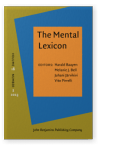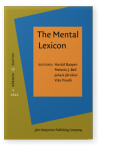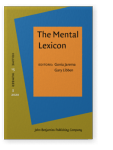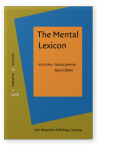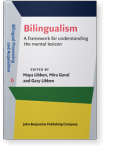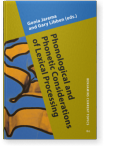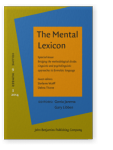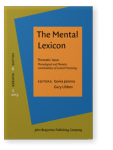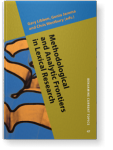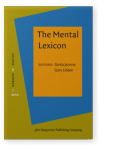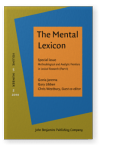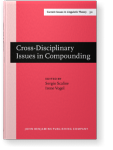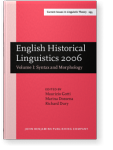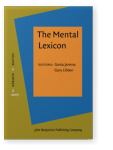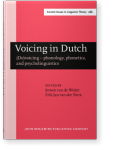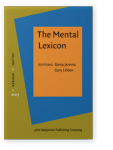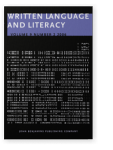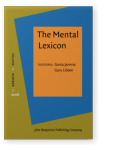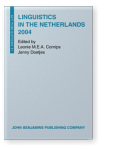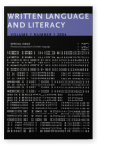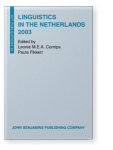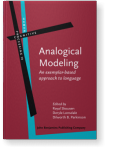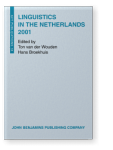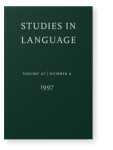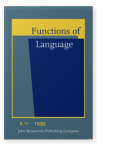Harald Baayen
List of John Benjamins publications for which Harald Baayen plays a role.
Journal
2022 A note on the modeling of the effects of experimental time in psycholinguistic experiments The Mental Lexicon 17:2, pp. 178–212 | Article
Thul et al. (2020) called attention to problems that arise when chronometric experiments implementing specific factorial designs are analysed with the generalized additive mixed model (GAMM), using factor smooths to capture trial-to-trial dependencies. From a series of simulations incorporating… read more
2021 Romance N Prep N constructions in visual word recognition: An eye-tracking study of French, Spanish and Portuguese The Mental Lexicon 16:1, pp. 98–132 | Article
N Prep N constructions such as Sp. bicicleta de montaña ‘mountain bike’ are very productive and frequent in Romance languages. They commonly have been classified as syntagmatic compounds that show no orthographic union and exhibit an internal structure that resembles free syntactic structures,… read more
2020 Simulating phonological and semantic impairment of English tense inflection with linear discriminative learning The Mental Lexicon 15:3, pp. 385–421 | Article
This study applies the computational theory of the ‘discriminative lexicon’ (Baayen, Chuang, and Blevins, 2019) to the modeling of the production of English verbs in aphasic speech. Under semantic impairment, speakers have been reported to have greater difficulties with irregular verbs, whereas… read more
2018 Inflectional morphology with linear mappings The Mental Lexicon 13:2, pp. 230–268 | Article
This methodological study provides a step-by-step introduction to a computational implementation of word and paradigm morphology using linear mappings between vector spaces for form and meaning. Taking as starting point the linear regression model, the main concepts underlying linear mappings… read more
2018 What does constituent priming mean in the investigation of compound processing? The Mental Lexicon 13:2, pp. 269–284 | Article
Most dictionary definitions for the term compound word characterize it as a word that itself contains two or more words. Thus, a compound word such as goldfish is composed of the constituent words gold and fish. In this report, we present evidence that compound words such as goldfish might not… read more
2017 Morphological integration and the bilingual lexicon Bilingualism: A framework for understanding the mental lexicon, Libben, Maya, Mira Goral and Gary Libben (eds.), pp. 197–216 | Chapter
In English, as in most of the world’s languages, the majority of words are multimorphemic. In the psycholinguistic literature on lexical processing in bilinguals, however, multimorphemic words have thus far received relatively little treatment. In this chapter, we discuss the opportunities that the… read more
2015 Learning is not decline: The mental lexicon as a window into cognition across the lifespan Phonological and Phonetic Considerations of Lexical Processing, Jarema, Gonia and Gary Libben (eds.), pp. 199–230 | Article
As otherwise healthy adults age, their performance on cognitive tests tends to decline. This change is traditionally taken as evidence that cognitive processing is subject to significant declines in healthy aging. We examine this claim, showing current theories over-estimate the evidence in support… read more
2014 N-gram probability effects in a cloze task Bridging the Methodological Divide: Linguistic and psycholinguistic approaches to formulaic language, Wulff, Stefanie and Debra Titone (eds.), pp. 437–472 | Article
What knowledge influences our choice of words when we write or speak? Predicting which word a person will produce next is not easy, even when the linguistic context is known. One task that has been used to assess context dependent word choice is the fill-in-the-blank task, also called the cloze… read more
2013 Learning is not decline: The mental lexicon as a window into cognition across the lifespan Phonological and Phonetic considerations of Lexical Processing, pp. 450–481 | Article
As otherwise healthy adults age, their performance on cognitive tests tends to decline. This change is traditionally taken as evidence that cognitive processing is subject to significant declines in healthy aging. We examine this claim, showing current theories over-estimate the evidence in support… read more
2012 Demythologizing the word frequency effect: A discriminative learning perspective Methodological and Analytic Frontiers in Lexical Research, Libben, Gary, Gonia Jarema and Chris Westbury (eds.), pp. 171–195 | Article
This study starts from the hypothesis, first advanced by McDonald and Shillcock (2001), that the word frequency effect for a large part reflects local syntactic co-occurrence. It is shown that indeed the word frequency effect in the sense of pure repeated exposure accounts for only a small… read more
2010 A real experiment is a factorial experiment? The Mental Lexicon 5:1, pp. 149–157 | Article
2010 Demythologizing the word frequency effect: A discriminative learning perspective Methodological and Analytic Frontiers in Lexical Research (Part I), Jarema, Gonia, Gary Libben and Chris Westbury (eds.), pp. 436–461 | Article
This study starts from the hypothesis, first advanced by McDonald and Shillcock (2001), that the word frequency effect for a large part reflects local syntactic co-occurrence. It is shown that indeed the word frequency effect in the sense of pure repeated exposure accounts for only a small… read more
2010 Frequency effects in compound processing Cross-Disciplinary Issues in Compounding, Scalise, Sergio and Irene Vogel (eds.), pp. 257–270 | Article
This chapter discusses the role of compound token frequency, head and modifier token frequency, and head and modifier compound family sizes (type frequencies) in the comprehension of English and Dutch compounds, using data from word naming, visual lexical decision, and eye-tracking studies. Using… read more
2010 Producing inflected verbs: A picture naming study The Mental Lexicon 5:1, pp. 22–46 | Article
Four picture naming experiments addressing the production of regular and irregular pasttense forms in Dutch are reported. Effects of inflectional entropy as well as effects of the frequency of the past-tense inflected form across regulars and irregulars support models with a redundant lexicon while… read more
2008 The balance between syntax and discourse in Old English English Historical Linguistics 2006: Selected papers from the fourteenth International Conference on English Historical Linguistics (ICEHL 14), Bergamo, 21–25 August 2006, Gotti, Maurizio, Marina Dossena and Richard Dury (eds.), pp. 3–21 | Article
Old English morpho-syntax allows a degree of word order flexibility that is exploited by discourse strategies. Key elements here are: adverbs functioning as discourse partitioners, and a wider range of pronominal elements, extending the number of strategies for anaphoric reference. The syntactic… read more
2007 Lexical dynamics for low-frequency complex words: A regression study across tasks and modalities The Mental Lexicon 2:3, pp. 419–463 | Article
In this study we examine the word recognition process for low-frequency morphologically complex words. One goal of the study was to replicate and expand upon findings suggesting facilitative effects of morphological relatives of a target word. A second goal was to demonstrate the need for a… read more
2007 6. Intraparadigmatic effects on the perception of voice Voicing in Dutch: (De)voicing – phonology, phonetics, and psycholinguistics, Weijer, Jeroen van de and Erik Jan van der Torre (eds.), pp. 153–174 | Article
In Dutch, all morpheme-final obstruents are voiceless in word-final position. As a consequence, the distinction between obstruents that are voiced before vowel-initial suffixes and those that are always voiceless is neutralized. This study adds to the existing evidence that the neutralization is… read more
2007 Regular morphologically complex neologisms leave detectable traces in the mental lexicon The Mental Lexicon 2:1, pp. 1–23 | Article
This study investigates whether regular morphological complex neologisms leave detectable traces in the mental lexicon. Experiment 1 (subjective frequency estimation) was a validation study for our materials. It revealed that semantic ambiguity led to a greater reduction of the ratings for… read more
2006 Formal and semantic constraints on the interpretation of the suffix ‑s in reading Dutch nominal compounds Written Language & Literacy 9:2, pp. 247–264 | Article
This study addresses the interpretation of a Dutch homonymic suffix, s, as it appears in Dutch compounds. In a series of reading experiments we manipulated the presence versus absence of this suffix in existing compounds as well as in compounds with a pseudoword as left constituent. We observed an… read more
2006 Dynamics of the auditory comprehension of prefixed words: Cohort entropies and Conditional Root Uniqueness Points The Mental Lexicon 1:1, pp. 125–146 | Article
This auditory lexical decision study shows that cohort entropies, conditional root uniqueness points, and morphological family size all contribute to the dynamics of the auditory comprehension of prefixed words. Three entropy measures calculated for different positions in the stem of Dutch… read more
2004 Seven years later: The effect of spelling on interpretation Linguistics in the Netherlands 2004, Cornips, Leonie and Jenny Doetjes (eds.), pp. 134–145 | Article
2004 Orthographic constraints and frequency effects in complex word identification Process and Acquisition of Written Language, Schreuder, Robert and Ludo Verhoeven (eds.), pp. 49–59 | Article
In an experimental study we explored the role of word frequency and orthographic constraints in the reading of Dutch bisyllabic words. Although Dutch orthography is highly regular, several deviations from a one-to-one correspondence occur. In polysyllabic words, the grapheme E may represent three… read more
2003 Verpleegsters, ambassadrices and masseuses: Stratum differences in the comprehension of Dutch words with feminine agent suffixes Linguistics in the Netherlands 2003, Cornips, Leonie and Paula Fikkert (eds.), pp. 117–127 | Article
2002 8. Analogical hierarchy: Exemplar-based modeling of linkers in Dutch noun-noun compounds Analogical Modeling: An exemplar-based approach to language, Skousen, Royal, Deryle Lonsdale and Dilworth B. Parkinson (eds.), pp. 181–206 | Chapter
2001 Choosing between the Dutch past-tense suffixes -te and -de Linguistics in the Netherlands 2001, Wouden, Ton van der and Hans Broekhuis (eds.), pp. 77–88 | Article
1997 The Pragmatics of the 'Tenses' in Biblical Hebrew Studies in Language 21:2, pp. 245–285 | Article
In this paper, I present an analysis of the so-called tense forms of Biblical Hebrew. While there is fairly broad consensus on the interpretation of the yiqtol tense form, the interpretation of the qdtal tense form has led to considerable controversy. I will argue that the qātal form has no… read more
1995 Toni Rietveld and Roeland Van Hout. Statistical Techniques for the Study of Language and Language Behavior Functions of Language 2:1, pp. 130–131 | To be specified
